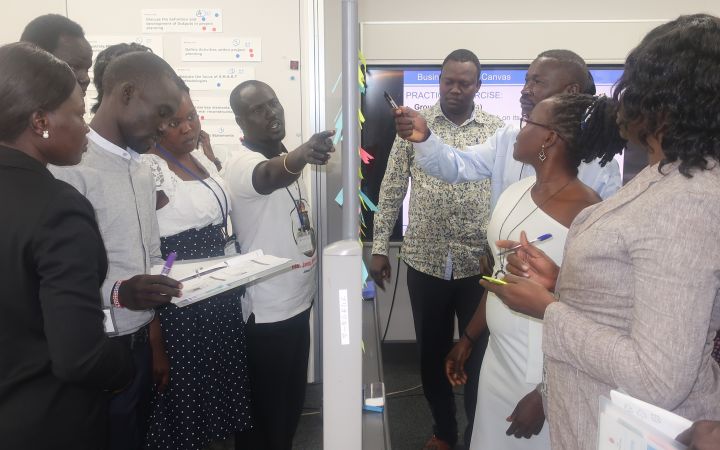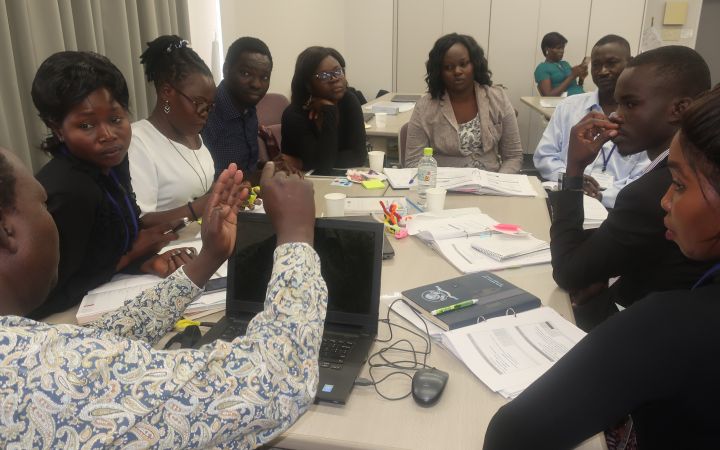1 June 2021, Hiroshima, Japan - The United Nations Institute of Training and Research (UNITAR) Division for Prosperity will launch the UNITAR Building Bridges: Entrepreneurship and Project Planning in South Sudan Programme on 1 June 2021 to empower South Sudanese youth with knowledge and skills in entrepreneurship, project management and leadership. The online programme, supported by the Government of Japan, will train 75 young professionals from the public, private and civil sectors, academia and media. The learners will be supported by a national coaching and mentoring team as well as international experts.
UNITAR will provide all participants with internet bundles to access the online learning. While the programme uses EdApp, a mobile-based adult-learning platform designed for learners in a low-data environment, the unreliability of the internet in South Sudan has been a serious barrier to online learning in the past. The internet bundles will therefore allow for seamless connection and enhanced learning.
Since 2015, UNITAR has run five cycles of the programme. Of the 116 alumni in South Sudan, 46 per cent are women.
Celebrating its 10th independence anniversary, South Sudan has made gradual progress rebuilding from the war. However, according to UNDP Human Development Index, South Sudan currently ranks at 185 out of 189, with 91 per cent of the population living below the poverty line. The COVID-19 pandemic has halted socioeconomic progress and eroded employment, exacerbating poverty and social inequality. This programme will support South Sudan's recovery by equipping young leaders and potential entrepreneurs with the skills to create livelihoods.
The programme will be run in two phases. The first phase will consist of asynchronous, self-paced online lessons covering topics on the basics of entrepreneurship and leadership. It will also address project planning, design, organizational needs assessments, and environmental analysis.
The second phase will focus deeper on entrepreneurship, project implementation, and leadership. In this phase, participants will complete a self-paced online course and participate in sessions facilitated by the national coaching and mentoring team. These sessions will help the participants use their newly acquired skills and develop project proposals to respond to the self-identified needs and priorities in South Sudan. The coaches are former standout participants who will undergo a "Coaching for Coaches" training.
The programme will cover how to design and conduct organizational needs and risk mitigation assessments and environmental analyses. Participants will learn to identify and integrate stakeholders. They will also learn about post-conflict reconstruction processes, results chain, business model canvas, design thinking, as well as monitoring and evaluation. They will recognize their own individual work styles and practice effective communication and teambuilding skills.
Initially planned for mid-2020, the programme was put on hold to adjust to COVID-19-imposed restrictions.
A local coordinator of the programme, Marial Duany, says:
The acquisition of these skills, knowledge and attitudes [will] play a greater role in enhancing individual performance and that of their institutions.
About UNITAR
The United Nations Institute for Training and Research (UNITAR) provides innovative learning solutions to individuals, organizations, and institutions to enhance global and country-level action for a better future. Located in Hiroshima, the Division for Prosperity trains present and future change-makers from developing countries, particularly youth and women, so they may shape a more inclusive, sustainable, and prosperous world. UNITAR established its South Sudan Project Office in 2015 to spark change through grassroots communities.








